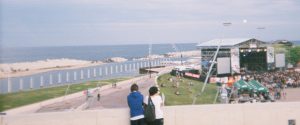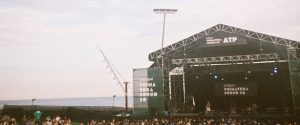What is it that Jarvis Cocker sang in that Pulp song? Oh yeah. Tugging on strands of blissed-out escapism, Cocker links rave’s field-trip culture to hanging around aimlessly on grass, neatly summing up every major (and minor) English festival as he does so. For some the summer music season feels like a passage into an untold future, while for many many more it’s just about hanging around on former farmland, watching some bands.
I’d had the Primavera festival’s merits rammed down my throat for a long year, but besides the quality of bands the one thing that kept reappearing was the twisted scale and space it sits inside. Between all of the talk of concrete and structure it seemed the strangeness of being Not In A Field had been overwhelming for some. But could it really have changed the music/audience/experience as much as they claimed?

Pitchfork’s arena sits a little behind the main stage under a canopy of solar panels. It’s a space used normally for climbing activities, natural sunlight landing on ropes, pulleys, nets, rigging – an urban playground in the sky. Beneath that Titus Andronicus seem tiny.
Until they play. The clatter-roar of discord and screaming is impenetrable for moments until the fury resolves itself. Desperation bellows from Patrick Stickles’ mouth, he’s pleading the audience to let him take us places, better places, but we’ll have to fight to get there. He wants us to be carried away by the momentum gathering behind him, typified by the benign and beautiful smile on bassist Amy Klein’s face from first note to final bow. It’s like they’re raising this monstrous structure from beneath the ground, a cavern of concrete ribs clinging to a thumping animal heart.
Days later, amid this eerie forest of columns, The Dum Dum Girls too leave an impression. Feet seemingly encased and locked tight in place, the four girls rock and bob to the garage rock stuttering, dressed in black and lace, patterned stockings drawing the gaze from the ankles slowly up. Up. Up. Up and above the heads of the vocal trio, to somewhere twelve feet above the stage height, the place where their harmony combines before bowling down and through each pillar and person watching. That apex where their voices meet is so very much more impressive than the parts where skin and cloth meet, or where the drums become incessant, and the roof to floor vibrates like so many chimes.
On another smaller stage, a little downhill, amid a sparse clutter of trees and ocean views Beach House cultivate the kind of shelter their moniker conjures. Sun-setting, their stage lights melt throughout the crowd and cast a warm glow of purple on faces that gently lap in time. Cymbal rushes pepper their set, and each little climax feels like a wave breaking. Truly entrancing, they make of this enclave some tropical space.
Shellac couldn’t do this, even accidentally. Their tropics are tumultuous, their moments of peace simply opportunities to glance up through a vortex before the storm whips up once more. If Beach House are a calm tropical ocean then Shellac are the riptides, ghost-ships and kraken of terrible legend. From where I watch I can hear the sea crashing.

All of the petty sordidness of a festival just flashes up that much starker on concrete. That bit at the back, filled with strangers pissing on walls or furtively sneaking a grope of their lovers. That bit is still there. Only it’s there at the top of a long ramp, silhouettes cast against an infinity-pool ocean, booze-addled fumbling rendered in stark black and blue for all to see. And it isn’t pretty, it isn’t pretty at all.
Nor are the kids at the Vice stage. I’m there for the awfully bland, awfully named Condo Fucks when the Jagermeister truck screams up, attainably hot guys and girls launching from it in skin-tight black tops, flinging branding at baying teens and pouring shot vials down the nearest throats. The guttural roar of the teenage fanclub as they fight tooth and nail to get there seems all the louder at this stage, set apart from the rest of the festival in an area that can only be described as a ‘pit’. There is even a viewing platform above it, closed for the weekend’s duration because, presumably, there are some things one just should not see.
With those kind of kids rolling around behind you it’s time to face front, and sometimes that’s not so pretty either. Night after night, with the moon fighting for attention beside an Adidas balloon, bands like Grizzly Bear and The xx ambled up to the mic and drawled slow paeans to onanism, naval-gazing self-loving rituals with nothing to say.
Seeing The xx live is like watching a car ad being made: you know, with all the gizmos and flashing lights, that a lot of money is going into this; you’re aware that there’s nothing actively repellent about what you’re being sold; you’re aware of being told your life might improve in some abstract way if you got to the core of the product like the people in front of you; you walk away wondering what all that was about, and a strange urge to visit a URL to find out more. Even in a live setting you feel that this is a band born of good-natured music licensing bods, eager to blend all the best bits of Portishead with the success of Moby’s Play.
What’s more startling is that on the same stage, with the same ‘blind-the-masses’ approach to lighting design, Orbital manage to slay the crowd. Primavera’s second stage cradles everyone at laser-light height; you cannot escape its glare, there is no-place to hide. It’s perhaps an homage to the huge bank of solar panels that overshadow it, a resource that Orbital seemingly hijacked to flash-burn each retina on site. Every element of sight and sound works in harmony to cast thousands into personal raves at the earliest of hours, concrete pinging as it cools beneath our feet.

For all of that storm and noise of course the only thing that really matters, at this scale, is how the headliners fare. Surrounded by seas and stark buildings it is instantly, painfully clear that spectacle is the order of success, the easiest way of establishing charisma and relationships in a place with its own unique shape and character. But
in Pixies and Pavement Primavera finds itself sorely lacking. Both bands engage with only themselves, introverted to an extreme, and while there is something admirable about letting the music speak for itself there isn’t really anything spectacular about it.
Keyed up earlier in the day by Florence & The Machine – whose full-tilt waif-mother-goddess act is becoming quite the showstopper – it is left to the Pet Shop Boys to recover the crowd’s spirits. And they delight. Far from intimate, far from reserved, they explode in a fury of colour and cubes, thousands of onlookers left with no choice but to damn well dance. Fingers in the air, shouting along in gnarled Spanglais, the crowd behave admirably under such a barrage of concentrated pop. It may not have brought these terrible structures tumbling to the ground, but on limping home we see we have been well and truly shattered.

One thought on “Primavera festival: transported by sound”
Comments are closed.